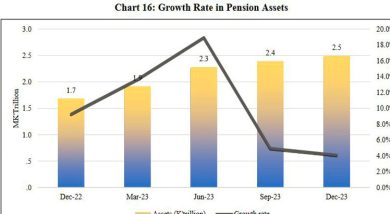Public debt on the rise
Malawi is one of the six countries in sub-Saharan Africa whose debt to GDP ratio has more than doubled in the past nine years, according to a World Bank report.
Debt to GDP ratio is the ratio between a country’s government debt to its nominal gross domestic product (GDP), currently at $6.3 billion (about K4.6 trillion) for Malawi.
The World Bank preliminary report titled Debt, Growth and Stability in Africa: Speculative Calculations and Policy has attributed the rising public debt, particularly external debt, to a 50 percent depreciation of the kwacha between 2012 and 2016.

It shows that Malawi’s public debt as a percentage of GDP rose from 29.6 percent in 2010 to 61.3 percent in 2018, with growth averaging 3.2 percent within the period.
In contrast, Malawi is fairing well compared to the other six high debt to GDP ratio countries, namely Mozambique (110.5 percent), Democratic Republic of Congo (98.5 percent), Angola (79.1 percent), Zimbabwe (77 percent) and Zambia (68 percent).
While recommending the need for countries to borrow as long as they are able to convert debt into investment and growth, the report observes that commercial banks now hold substantial parts of external debt of some countries.
Reads the report: “The strategy sounds simple: borrow when it is cheaper than raising development finance through taxes, spend wisely on things that yield results before the loans come due and repay as much as you can when times are good.”
World Bank country economist Priscilla Kandoole said in the June 2019 Malawi Economic Monitor (MEM) released on Tuesday in Lilongwe that accumulation of public debt presents a significant risk as fiscal deficit is expected to be largely financed by high-cost domestic borrowing.
“With the fiscal deficit expected to widen over initial budget projections, this will increase domestic public debt, undermining fiscal sustainability,” she said.
Economics Association of Malawi (Ecama) statistics show that debt to GDP ratio has a maximum threshold of 50 percent with 20 percent being domestic debt and 30 percent foreign debt.
Reserve Bank of Malawi (RBM) figures put public debt at K3.3 trillion, which is more than double the K1.3 trillion 2018/19 National Budget.
As at December 2018, external debt stood at $2.1 billion (about K1.6 trillion) with debt from multilateral creditors accounting for 80.3 percent of the total debt stock while the remaining share constituted debt from bilateral creditors.
Domestic debt on the other hand stood at $2.2 billion (about K1.7 trillion) with Treasury notes and Treasury bills dominating the domestic debt portfolio at 60.1 percent and 32.8 percent, respectively.
In 2010, external debt stood at $846.2 million while domestic debt was at K154.7 billion.
In 2006, Malawi debt was cut by 90 percent under the Heavily Indebted Poor Countries (Hipc) from $3 billion (K501 billion then) to around $400 million (K66.8 billion).





